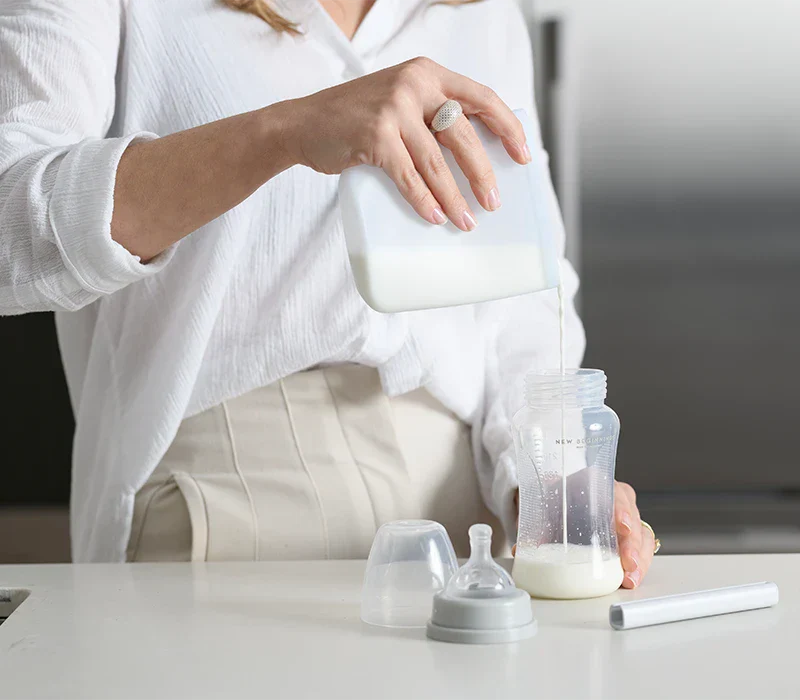Maternity Blog & News | New Beginnings
Nutrition & Diet during Pregnancy | New Beginnings
While good nutrition is important at any time, during pregnancy it becomes particularly so. While you require extra nutrients for yourself and your growing baby during this time, you don’t actually need to eat a great deal more in the way of kilojoules. The important thing during pregnancy is to eat food that is very nutrient-dense. What is nutrient-dense food? Nutrient-dense food contains a high proportion of nutrients in relation to its energy (kilojoule) count. You could say that nutrient-dense food is the opposite of empty-calorie food, such as confectionary and some other snack-type foods. What are the general daily guidelines for eating? Eat most of – nutrient-dense foods such as wholegrain breads and cereals, vegetables, legumes and fruits. Eat moderately – calcium foods such as dairy or substitutes, and protein foods such as cooked meat, poultry, fish (low mercury), or eggs. Nuts and seeds are also good, and seaweed products for iodine. Smallest amounts of – foods high in sugar, fat and salt. Don’t forget to keep well hydrated at all times as well. What extra nutrients are required in pregnancy? A folate (folic acid) dietary intake of 600mcg per day is especially important to prevent certain birth defects. The best sources are fortified breads and cereals, green vegetables, legumes, oranges, vegemite, strawberries, salmon and nuts. Authorities also recommend a supplement during pregnancy of 400mcg per day for the first month before pregnancy and throughout the first trimester. Iron needs increase in pregnancy to 27mg per day. Best sources are lean meats and fish, fortified cereals and breads, eggs, legumes and green vegetables. Animal sources such as meat and eggs are absorbed more efficiently than vegetable ones. Vitamin C helps with the absorption of iron, so a glass of orange juice with your morning eggs can be a good combination. Iodine becomes particularly important in pregnancy. Iodine is found in seafood, seaweed products, meat, eggs, dairy and iodised table salt. Do I need supplements? It’s important to speak to your doctor about your nutrition during pregnancy, including what supplements you should take. Is there anything to avoid? Definitely, especially since immunity is usually lower during pregnancy. Raw eggs, raw legumes or alfalfa sprouts, undercooked meats – these present a salmonella and toxoplasmosis risk. Soft cheeses, soft-serve ice cream, pate, raw fish, and cold deli meats – these present a risk of listeria. Excess seafood – high mercury risk. Salmon or tuna two to three times per week is fine, but caution should be used with billfish, deep-sea perch and catfish. Excess caffeine – this may reduce iron absorption. Too much vitamin A – which is toxic at high doses. Alcohol – ideally this should be avoided altogether. In addition, it’s important to be particularly scrupulous about hygiene during this time. This includes washing hands, always washing fruits and vegetables, cooking foods thoroughly, and minimising contacts with household cats as they carry the parasite toxoplasmosis – harmful for your developing baby. You may also find your tastes changing during pregnancy, which is quite common. There is no need for alarm, but if you do feel that this might be compromising your nutrition, consult your health care practitioner and/or a professional dietician. Benefits of Relaxation for Pregnant Mums We all know how good it feels to relax, and this can be especially important during pregnancy. Pregnancy can be a time fraught with anxious thoughts and stress for some women, particularly first-time mums. In this post we look at the importance of relaxation during pregnancy, and provide some tips on how to go about it. Pregnancy stress During pregnancy you may find yourself having anxious thoughts about the future. You may be wondering whether you will make a good parent, how you will cope with the labour and with a new baby, and whether you can manage on a reduced income. While these can be very real issues, worrying about them doesn’t change them and nor does it do anything for your happiness. So you may as well relax a little. In addition, it’s hard to solve problems when you are wound up, and relaxation techniques and methods can very often lead to an increase in creative thinking and problem solving. Benefits of relaxation Relaxation has benefits for both mother and baby. Relaxation is good for reducing your blood pressure, enhancing your wellbeing and enjoyment of life, reducing pain and worry, and improving overall health. As for the baby, they are more likely to be relaxed if mum is! Some relaxation methods and tools Meditation helps reduce mood swings, improve sleep, reduce anxiety, and even improve digestion and boost immunity. Types include passive practices such as mindfulness and mantra meditation, or active / dynamic practices like QiGong or Tai Chi. Consider joining a local class or making use of some of the free or low-cost online programs. Regular exercise. Exercise is known to improve wellbeing and reduce stress. Safe options during pregnancy include Hatha yoga, walking, swimming and other water exercises, bike riding, and Pilates. EFT (Emotional Freedom Technique) Tapping. This is a practical tool which involves thinking or talking about troubling issues while tapping on certain points on your body. Many people find EFT a wonderful method for reducing stress and anxiety and also for altering their perception of problems and issues. Plenty of rest! At this time, you really need to listen to your body and rest when you need to. And don’t fall into the guilt trap – if people around you want you to put your feet up and wait on you sometimes, lap it up and enjoy! Lots of laughter. Laughter helps reduce stress so make time to watch your favourite comedies and to hang out with happy people at least some of the time! A ‘babymoon’. Go on a pre-birth babymoon with your partner or a friend, or even on your own if you are so inclined. Other ideas for relaxation include massage, aromatherapy, and beauty treatments for a self-esteem boost. Get some more pregnancy relaxation techniques from some of our top rated pregnancy podcasts. Good nutrition can also help you to cope with the stresses in your life – so as well as employing some of the above techniques, make the effort eat really well and to always keep yourself well hydrated.For more information about women's health, explore our Women's Health Week blog.
Learn moreAre essential oils safe to use during pregnancy? | New Beginnings
Essential oils can provide a great pick-me-up during pregnancy, you do need to be careful about the oils you choose, and their application. Here are some tips to safely enjoy aromatherapy throughout your pregnancy. The benefits of essential oils Aromatherapy been used for thousands of years. For many expectant mothers, it’s a natural and effective way to enhance mood, encourage relaxation, or even increase energy and vitality. It can also help you to better deal with the effects of pregnancy discomforts like nausea, or aching feet. The thing to keep in mind is that these powerful plant extracts can have a considerable impact on the body. There are hundreds of different oils to choose from, each with their own benefits and potency, and there are some that are better to use during pregnancy than others, so it’s important to select your oil carefully and clear it with your practitioner. Used correctly, the right oil can assist in providing relief for many of those pregnancy aches and pains. And the best part? It’s all natural! How to use oils during pregnancy If you’re just thinking of adding a couple of drops of oil to the bath, a foot soak, or a , this use of essential oils is considered to be very safe, plus it’s a terrific way to unwind and relax. The US National Association for Holistic Aromatherapy (NAHA) states that inhalation presents a very low risk since the concentration of oil is minimal. However, when it comes to applying essential oils directly to your skin, the jury’s still out. With no conclusive research, experts remain unclear on the effect of some oils during pregnancy. The main concern is whether oil constituents might cross over into the placenta, particularly during that all-important first trimester, and what effect that might have on the developing baby. So talk to your doctor or midwife before using any type of essential oil directly on your skin, and if you get the go-ahead, always start with just a drop at a time in a base oil. Oils that are generally safe to use According to the NAHA, the following essential oils are considered to be safe for use during pregnancy: Cardamon German and Roman chamomile Frankincense Geranium Ginger Neroli Patchouli Petitgrain Rosewood Rose Sandalwood Oils to avoid The NAHA recommends avoiding the following oils throughout pregnancy, labour and while seed or leaf Pennyroyal Sage Tansy Tarragon Thuja Wintergreen Wormwood Experts also recommend avoiding nutmeg, rosemary, jasmine and clary sage, juniper berry, laurel, angelica, thyme, cumin, aniseed, citronella and cinnamon leaf. A word of caution Make sure you consult your doctor or midwife before trying essential oils. Aromatherapy can be a wonderful way to relieve some of the discomforts of pregnancy, however it is suggested that those with the following conditions steer clear of essential oils bleeding or any complications during pregnancy History of miscarriage Heart problems Diabetes Epilepsy Blood clotting problems Top tips for using essential oils If you’d like to give aromatherapy during your pregnancy, here are a few tips: Wait until the second trimester. Use only oils. Dilute your oils. If applying to your skin or using in the bath, just use one drop at a time and mix it with a base oil such as grapeseed or sweet almond oil. Try not to leave a on for too long. 10-15 minutes will give you all the benefits, without becoming overpowering. Choose your essential oils with care and avoid using anything you haven’t tried before. Don’t use oils internally, and be sure to keep them away from your eyes. Use oils conservatively. It’s best to keep them as a special treat to use now and then as opposed to a daily indulgence. For more information, visit our Maternity Blog Essential Oil Guide. Take care of yourself through every stage of your pregnancy with our full range of maternity items. You can also shop by trimester and find the perfect maternity bra and support products. For tips and information on a range of pregnancy issues, have a browse through our library of blog articles. Sources:bellybelly.com.au - Essential Oils In Pregnancy – Which Essential Oils Are Safe To Use?Babycentre - Is it safe to use essential oils while I'm pregnant?National Association for Holistic Aromatherapy - Exploring Aromatherapy - Safety Information
Learn more







